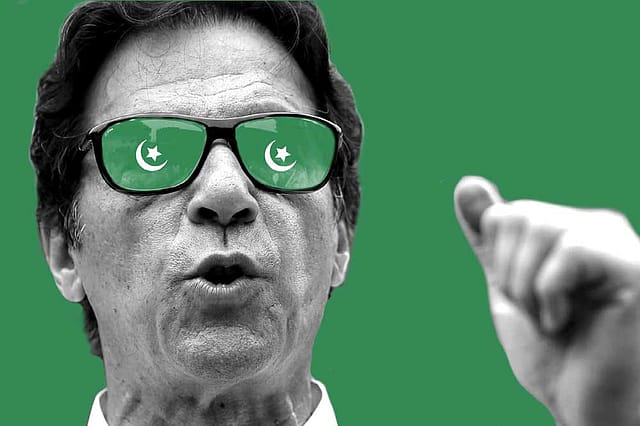Imran Khan: Captain Pakistan

AS IT TURNED out, the just-concluded general election in Pakistan was somewhat like the country itself—rancorous, disorderly, violent, suspicious, but still chugging along on some complex force that few can understand. It is in this environment that Imran Khan, who once was thought to be the symbol of progressive reform in a society increasingly getting ossified, has finally come within striking distance of the crown. But in that spread between his floating of the Pakistan Tehreek- e-Insaf (PTI) in 1996 and now, 22 years later, Khan himself has become the Establishment Man: who twirls a rosary in his hand because if you looked at his past, there wasn’t much religion there, and therefore his new-found credentials need to be relentlessly reinforced; who promised a liberal anti- corruption revolution, and now stands accused of being the political handmaiden of the country’s army, the force that keeps Pakistan chained to its past.
Khan is ridiculed by some as being the Donald Trump of Pakistan and that is probably unfair. Trump jumped directly into the president’s chair. Khan has been slogging it out in the dust and grit of Pakistani politics for decades. The parallel between the two are opportunism and success. Trump, despite his New York liberal billionaire lifestyle, became the leader of America’s ultra-conservative, Bible-thumping rightists by telling them what they wanted to hear. Khan, with his life steeped in Western culture and wife a member of British high society when he joined politics, has carefully catered to Islamism in Pakistan. The reason was simple enough for both men: victory is impossible without it. It is the toll that politics extracts. And men who are born to succeed easily adapt to it.
2025 In Review
12 Dec 2025 - Vol 04 | Issue 51
Words and scenes in retrospect
It is not very well remembered that when Khan captained the Pakistan cricket team to a One-Day International World Cup win, he was 39 years old. He had hit the peak of his bowling prowess 10 years before that and had even retired once. In 1992, no one had given Pakistan much of a chance and Khan promoted himself up the order to bolster the batting. He was neither the best batsman nor bowler then, but the team had his stamp on it. He had crafted a young side, spotting talent like Inzamam-ul-Haq. And that they went on to win the trophy was at least partly a result of how he drove his team. His will was written all over that triumph.
Politics is a different creature to ride. There is little will that can be asserted, merely compromises, negotiations and manoeuvres. Khan has done admirably well. He supported Pervez Musharraf after the 1999 coup, and when it was becoming clear that the general’s time was over, joined the agitation against him. He drew the largest crowds in the last election, but when the results came, the organisation of Nawaz Sharif had trounced him. When the army had had enough of Sharif, Khan allied with the agency that could ensure him power, and it seems to have worked.
Is it a Faustian pact? Probably not. He is not giving anything up simply because Khan had little of substance to begin with. To read the manifesto of the Pakistan Tehreek-e-Insaf is to see everything promised to everyone:
• ‘We will launch a judicial reforms programme…’
• ‘…work on a blueprint towards resolving the Kashmir issue within the parameters of UNSC resolutions. For lasting peace within our own region, especially with our neighbour India, conflict resolution and the security route to cooperation is the most viable. Also, in the context of bilateral relations, PTI’s focus will be on moves to expand the existing strategic partnership with China…’
• ‘PTI will move substantively on the bilateral strategic dialogue with India encompassing all aspects of the strategic nuclear deterrence so as to prevent a spiralling nuclear arms race in the region.’
And so on, policies that the elected government can do little about without the army’s go-ahead. What sort of prime minister will Khan be is an interesting question, one without any answer. He has the capacity to evolve and has proven his leadership. The trouble in Pakistan is that prime ministers start taking their position seriously. When they develop a mind of their own is when they are pulled down by the real rulers of the country.
Meanwhile, the country braces for its new leader even as the opposition unites in charges of rigging. A report in the Pakistani newspaper Dawn with the headline, ‘Imran’s Pakistan Beckons’ says: ‘This PTI success marks a new era. Imran’s struggle was avowedly to end the domination of not just one party but he sought to correct a whole system that had been exploited. The main culprits in his book were the Pakistan Peoples Party (PPP) and the PML-N. In some of his recent remarks, he made it quite clear that he was allergic to the idea of having to enter into an alliance with the PPP of Asif Zardari, who to the PTI cadres is the epitome of all that is bad in the country.’ Without a majority, Khan needs allies and if he chooses parties he has been opposing, then it would just affirm his malleability. That might, however, be a good quality to have as Pakistan’s leader today.
